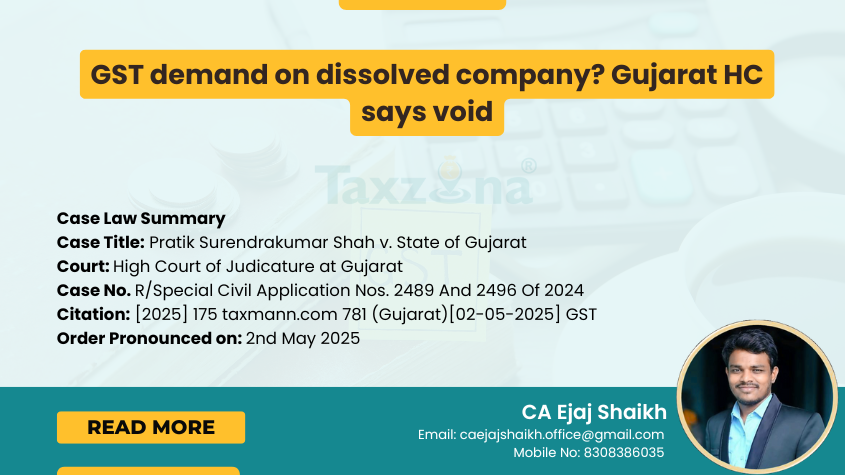Gujarat HC Quashes GST Demand Against Dissolved Company

1. Issue Involved
- The key issue involved in this case was whether the tax authorities could validly initiate proceedings under Section 73 of the Central Goods and Services Tax Act, 2017 (CGST Act) against a company that had already been dissolved pursuant to an order of voluntary liquidation and subsequent dissolution issued by the National Company Law Tribunal (NCLT).
The core question was whether such demand orders and recovery actions issued in the name of a non-existent company could be sustained in law.
Facts of the Case
- The petitioner, Mr. Pratik Surendrakumar Shah, was the former director of M/s. Zeb IT Service Limited, a company engaged in facilitating the sale and purchase of virtual currencies. The company decided to wind up its operations and filed for voluntary liquidation before the NCLT. Before doing so, it duly informed the GST department via letters dated 01/10/2020 and 27/10/2020, including a request for the department to submit any pending claims.
- Subsequently, an online application for cancellation of GST registration was made, and the department cancelled the registration effective from 13/11/2020.
- On 30/09/2022, the NCLT passed an order for the dissolution of the company, and an intimation was submitted to the Registrar of Companies.
- Despite this, the State GST Department issued show cause notices dated 28/09/2023 and 29/12/2023 under Section 73 of the CGST Act for the financial years 2017–18 and 2018–19, respectively, and proceeded to pass demand orders in the name of the now-dissolved company.
- The petitioner, in response to these notices, submitted that no proceedings could be initiated in the name of a dissolved entity and requested the dropping of the proceedings.
- However, the department proceeded to pass demand orders and initiate recovery actions on the basis that no relevant documents were submitted along with the reply.


3. Observations of the Court
- The Hon’ble Gujarat High Court observed that the department had indeed acknowledged in its own orders that the company in question had already been dissolved with effect from 30/09/2022.
- Despite this admission, the authority proceeded to raise the demand against the company solely on the ground that the petitioner did not submit the supporting documentation in response to the show cause notices.
- The Court found this action to be contrary to the settled legal position, noting that initiating proceedings against a non-existent company was not permissible in law.
- It further held that the respondent authority had acted without proper application of mind and disregarded the legal consequences of dissolution. The Court also relied on the Supreme Court’s ruling in Pr. CIT v. Maruti Suzuki (India) Ltd. (2020) 18 SCC 331, which held that once an entity is dissolved or ceases to exist due to amalgamation, any proceedings initiated in its name are void ab initio.
4. Judgment of the Court
- The Gujarat High Court quashed and set aside the impugned orders passed under Section 73 of the CGST Act as well as the related recovery notices.
- The Court held that all proceedings initiated and orders passed against M/s. Zeb IT Service Limited were unsustainable in law due to the company’s dissolved status.
- It categorically stated that actions taken against a non-existent entity are without jurisdiction and void. As a result, both Special Civil Applications (SCA No. 2489 and 2496 of 2024) filed by the petitioner were allowed in favour of the assessee.
6. Key Learnings from the Judgment
- This case reaffirms the principle that once a company is dissolved through a legal order of dissolution, it ceases to exist in the eyes of the law, and no proceedings can be initiated or continued against such an entity.
- Even though Section 29(3) of the CGST Act provides that cancellation of registration does not extinguish liability, such liability must be pursued through proper legal channels, such as initiating proceedings against legal representatives, liquidators, or through the insolvency process—not in the name of a dissolved entity.
- The judgment also stresses the need for departmental officers to act with due diligence and to apply their minds before issuing orders. Failure to do so may render such orders void and unenforceable.
7. Conclusion
In conclusion, the Gujarat High Court has rightly held that initiating demand proceedings against a dissolved company is not legally sustainable. This judgment strengthens the legal protection for dissolved entities and their former officers against arbitrary tax proceedings. It also serves as a reminder to tax authorities to verify the legal status of an assessee before initiating any proceedings.
The decision is aligned with the Supreme Court’s jurisprudence and upholds the rule of law by ensuring that taxation powers are exercised within constitutional and statutory limits.
Recent Post
Have Any Question?
Our experts at Taxzona are here to help you with GST, Income Tax, and all your financial queries. Get reliable guidance tailored to your business and personal needs.

